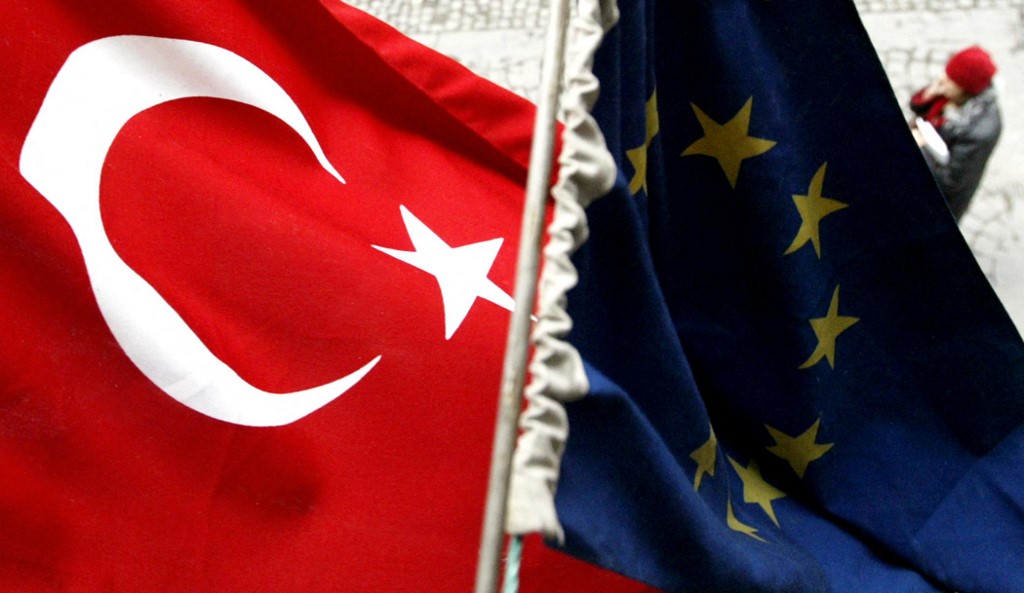Turkey’s uneasy relations with the European Union have halted its EU membership drive and turned the bloc into a favorite target of President Recep Tayyip Erdoğan’s barbs.
But as the sides meet in Ankara for their first face-to-face talks in a year, they must address a new raft of problems, including Turkey’s aggressive hunt for energy in eastern Mediterranean waters and a tense migrants dispute.
We look back on more than a half-century of ups and downs.
1963: Association agreement
Turkey signs an association agreement with the then European Economic Community, the precursor of the EU. It includes provisions for a gradual lowering of customs barriers prior to full EEC membership.
1974: Cyprus invasion
Turkey invades northern Cyprus in July after a coup attempt in Nicosia in an act condemned by all European countries. The Cypriot question becomes a thorny issue that will only get more complicated after Greece and Cyprus join the bloc.
1980: Coup de grace
The association agreement is frozen after a fiercely repressive military coup in Turkey.
In 1987 Ankara officially declares its EU candidacy but the European Commission rejects it, citing economic and political problems.
1999: EU candidate
Turkey, a NATO member, is finally granted candidate status weeks before the new millennium. But the EU says negotiations will not begin until Ankara meets democratic and human rights norms.
In August 2002 Turkey passes a series of reforms, abolishing the death penalty and improving civil rights for the Kurdish minority.
2003: ‘The Erdoğan Spring’
The Islamic-rooted AKP leader Recep Tayyip Erdoğan becomes prime minister in 2003 and adopts a broad range of democratic reforms.
Two years later EU membership talks finally begin, but progress is slow.
The 2004 European Parliament elections sees populist parties, hostile to entry by Muslim-majority Turkey, break through.
While some progress is made, France under then President Nicolas Sarkozy and German Chancellor Angela Merkel block the expansion of negotiations.
Ankara meanwhile refuses to normalize relations with Cyprus or extend its free movement agreements with the EU to the divided island.
2015: Migrant crisis
In late 2015 Turkey emerges as a strategic player in Europe’s worst migrant crisis since World War II. Relations soured by Turkey’s repression of a 2013 wave of anti-Erdoğan protests begin to warm.
In March 2016 Ankara and the EU sign a controversial deal to stem the flow of migrants, mostly from war-torn Syria and Iraq.
2016: Failed coup
After Erdoğan survives a coup in July 2016 deep strains develop as he embarks on a series of massive purges, further muzzles the media and locks up tens of thousands of opponents and “terrorists”.
2019: Tensions in the Med
Turkey signs a controversial security agreement in November with Libya’s UN-recognized government, claiming extensive areas of the Mediterranean for itself in return for military help.
The area has long been disputed between Greece and Turkey, with Ankara’s appetite whetted by discoveries of large natural gas reserves.
In July 2020 Greece signs a rival agreement with Egypt that partially overlaps with the Turkey-Libya deal.
Ankara also sparks fury by drilling in waters off Cyprus in defiance of warnings from the EU and US, prompting France to send warships to the area.
Greek and Turkish warships collide while tailing each other in August, putting the EU and NATO on edge.
2021: De-escalation?
In December 2020 EU leaders condemn Turkey’s “unilateral and provocative activities” and draw up a list of Turkish targets for sanctions.
Ankara condemns the move as “biased” and “unlawful” but Erdoğan later says he hopes to turn a “new page” in relations.
EU leaders cautiously agree to re-engage with Turkey in March 2021 if the “current de-escalation is sustained”.
Turkey dismisses Brussels’ “narrow-minded” demands but still commits to taking “positive steps.”
AFP


